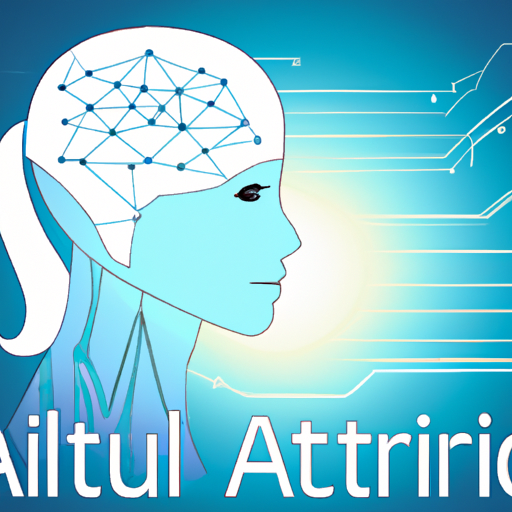“Unlock the Future with Artificial Intelligence: A New Era of Possibilities”
Introduction
The future of Artificial Intelligence (AI) is an exciting prospect. AI has the potential to revolutionize the way we live, work, and interact with each other. AI can be used to automate mundane tasks, improve decision-making, and even create new products and services. AI is already being used in a variety of industries, from healthcare to finance, and its potential is only beginning to be explored. In the coming years, AI is expected to become even more powerful and pervasive, with applications in virtually every sector of the economy. This article will explore the future outlook of AI and its potential to transform our lives.
The Impact of AI on the Future of Workforce Management
The impact of artificial intelligence (AI) on the future of workforce management is expected to be significant. AI is already being used in many areas of workforce management, such as recruitment, scheduling, and performance management. As AI technology continues to evolve, its potential to revolutionize the way organizations manage their workforce is immense.
AI can be used to automate many of the mundane tasks associated with workforce management, such as scheduling and payroll processing. This can free up time for managers to focus on more strategic tasks, such as developing and implementing strategies to improve employee engagement and productivity. AI can also be used to analyze data and identify trends in employee performance, allowing managers to make more informed decisions about how to best manage their workforce.
AI can also be used to improve the recruitment process. AI-powered recruitment software can analyze job descriptions and resumes to identify the best candidates for a position. This can help organizations save time and money by reducing the amount of time spent on manual screening and interviewing. AI can also be used to identify potential candidates who may not have applied for a position, but who may be a good fit for the role.
Finally, AI can be used to improve employee engagement and performance. AI-powered software can analyze employee data to identify areas of improvement and suggest ways to increase engagement and productivity. This can help organizations create a more positive work environment and ensure that employees are performing at their best.
In conclusion, AI is expected to have a significant impact on the future of workforce management. AI can be used to automate mundane tasks, improve the recruitment process, and increase employee engagement and performance. As AI technology continues to evolve, its potential to revolutionize the way organizations manage their workforce is immense.
The Role of AI in the Future of Automation
The role of Artificial Intelligence (AI) in the future of automation is an increasingly important topic of discussion. AI is a form of technology that enables machines to learn from their environment and make decisions without human intervention. This technology has the potential to revolutionize the way automation is used in many industries, from manufacturing to healthcare.
AI can be used to automate processes that are too complex or time-consuming for humans to complete. For example, AI can be used to automate the process of analyzing large amounts of data, such as in the healthcare industry. AI can also be used to automate the process of making decisions, such as in the financial industry. AI can also be used to automate the process of controlling machines, such as in the manufacturing industry.
AI can also be used to improve the accuracy and efficiency of automation. For example, AI can be used to identify patterns in data that can be used to make more accurate predictions. AI can also be used to optimize the performance of machines, such as in the manufacturing industry. AI can also be used to automate the process of controlling machines, such as in the automotive industry.
AI can also be used to improve the safety of automation. For example, AI can be used to detect potential hazards and alert operators to take action. AI can also be used to monitor the performance of machines and alert operators if something is not working correctly.
In conclusion, AI has the potential to revolutionize the way automation is used in many industries. AI can be used to automate processes, improve accuracy and efficiency, and improve safety. As AI technology continues to develop, it is likely that AI will become an integral part of automation in the future.
Exploring the Potential of AI in Healthcare
The potential of artificial intelligence (AI) in healthcare is immense. AI has the potential to revolutionize the healthcare industry, from diagnosis and treatment to patient care and management. AI can help healthcare providers make more accurate diagnoses, provide more personalized treatments, and improve patient outcomes.
AI can be used to analyze large amounts of data quickly and accurately. This can help healthcare providers identify patterns and trends in patient data that may not be visible to the human eye. AI can also be used to identify potential health risks and provide early warning signs of disease. AI can also be used to develop personalized treatments based on a patient’s individual characteristics and medical history.
AI can also be used to automate administrative tasks, such as scheduling appointments, managing patient records, and billing. This can help healthcare providers save time and money, while also improving the quality of care. AI can also be used to improve patient engagement and satisfaction by providing personalized health advice and reminders.
AI can also be used to improve the accuracy and speed of diagnosis. AI-powered diagnostic tools can help healthcare providers identify diseases more quickly and accurately. AI can also be used to develop new treatments and therapies, as well as to identify potential drug interactions and side effects.
Finally, AI can be used to improve the safety and security of healthcare data. AI-powered security systems can help protect patient data from unauthorized access and ensure that only authorized personnel have access to sensitive information.
The potential of AI in healthcare is immense, and the possibilities are only beginning to be explored. AI has the potential to revolutionize the healthcare industry and improve patient outcomes. As AI technology continues to evolve, healthcare providers will be able to take advantage of its many benefits.
The Impact of AI on the Future of Education
The impact of artificial intelligence (AI) on the future of education is likely to be profound. AI has the potential to revolutionize the way we learn, teach, and assess knowledge. AI-driven technologies such as machine learning, natural language processing, and computer vision are already being used in educational settings to improve student outcomes.
AI can be used to personalize learning experiences for students. AI-driven technologies can analyze data from student interactions with educational materials and provide personalized feedback and recommendations. AI can also be used to create adaptive learning systems that can adjust the difficulty of material based on a student’s performance. This can help ensure that students are challenged at the right level and can progress at their own pace.
AI can also be used to automate the grading process. AI-driven technologies can analyze student work and provide feedback in real-time. This can help reduce the amount of time teachers spend grading and allow them to focus more on providing personalized instruction. AI can also be used to detect plagiarism and provide feedback on student writing.
AI can also be used to create virtual tutors and mentors. AI-driven technologies can provide personalized guidance and feedback to students. This can help students stay motivated and engaged in their learning. AI can also be used to create virtual classrooms where students can interact with each other and their teachers in real-time.
The potential of AI to revolutionize the way we learn, teach, and assess knowledge is immense. AI-driven technologies can help create personalized learning experiences, automate the grading process, and create virtual tutors and mentors. As AI continues to develop, it is likely to have a profound impact on the future of education.
How AI is Transforming the Future of Business
The advent of artificial intelligence (AI) has revolutionized the way businesses operate. AI has enabled businesses to automate mundane tasks, improve customer service, and gain insights from data. As AI continues to evolve, it is transforming the future of business in unprecedented ways.
AI is being used to automate mundane tasks, such as data entry and customer service. Automation can save businesses time and money, as well as reduce the risk of human error. AI can also be used to analyze customer data and provide personalized recommendations. This can help businesses better understand their customers and provide them with more tailored services.
AI is also being used to improve customer service. AI-powered chatbots can provide customers with quick and accurate answers to their questions. AI can also be used to analyze customer feedback and identify areas of improvement. This can help businesses provide better customer service and increase customer satisfaction.
Finally, AI can be used to gain insights from data. AI-powered analytics can help businesses identify trends and patterns in their data. This can help businesses make better decisions and improve their operations. AI can also be used to predict customer behavior and anticipate customer needs. This can help businesses stay ahead of the competition and remain competitive in the market.
As AI continues to evolve, it will continue to transform the future of business. AI can help businesses automate mundane tasks, improve customer service, and gain insights from data. This can help businesses stay ahead of the competition and remain competitive in the market. AI is revolutionizing the way businesses operate and is transforming the future of business in unprecedented ways.
Conclusion
The future outlook of Artificial Intelligence is very promising. AI technology is rapidly advancing and is being used in a variety of industries, from healthcare to finance. AI is being used to automate mundane tasks, improve customer service, and even create new products and services. AI is also being used to improve decision-making, increase efficiency, and reduce costs. As AI technology continues to evolve, it will become even more powerful and useful. AI will continue to revolutionize the way we live and work, and it will continue to have a major impact on our lives.



